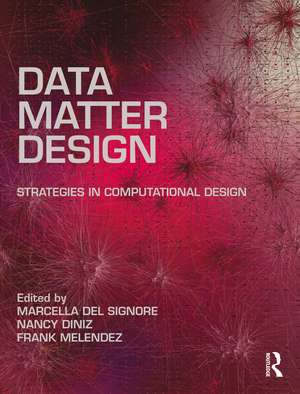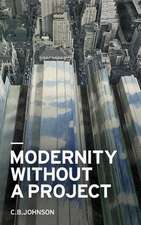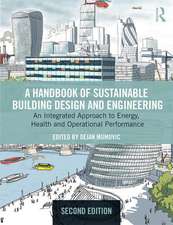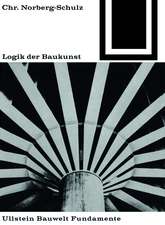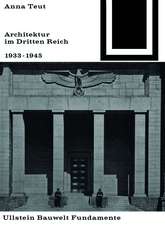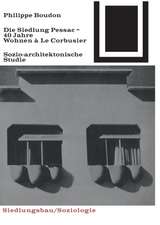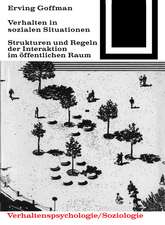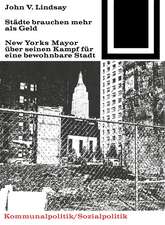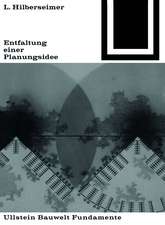Data, Matter, Design: Strategies in Computational Design
Editat de Frank Melendez, Nancy Diniz, Marcella Del Signoreen Limba Engleză Paperback – 30 sep 2020
Technological changes, through the use of computational tools and processes, have radically altered and influenced our relationship to cities and the methods by which we design architecture, urban, and landscape systems. This book presents a wide range of curated projects and contributed texts by leading architects, urbanists, and designers that transform data as an abstraction, into spatial, experiential, and performative configurations within urban ecologies, emerging materials, robotic agents, adaptive fields, and virtual constructs.
Richly illustrated with over 200 images, Data, Matter, Design is an essential read for students, academics, and professionals to evaluate and discuss how data in design methodologies and theoretical discourses have evolved in the last two decades and why processes of data collection, measurement, quantification, simulation, algorithmic control, and their integration into methods of reading and producing spatial conditions, are becoming vital in academic and industry practices.
| Toate formatele și edițiile | Preț | Express |
|---|---|---|
| Paperback (1) | 282.50 lei 3-5 săpt. | +27.16 lei 6-12 zile |
| Taylor & Francis – 30 sep 2020 | 282.50 lei 3-5 săpt. | +27.16 lei 6-12 zile |
| Hardback (1) | 775.72 lei 6-8 săpt. | |
| Taylor & Francis – 30 sep 2020 | 775.72 lei 6-8 săpt. |
Preț: 282.50 lei
Nou
Puncte Express: 424
Preț estimativ în valută:
54.05€ • 56.44$ • 44.74£
54.05€ • 56.44$ • 44.74£
Carte disponibilă
Livrare economică 14-28 martie
Livrare express 27 februarie-05 martie pentru 37.15 lei
Preluare comenzi: 021 569.72.76
Specificații
ISBN-13: 9780367369095
ISBN-10: 0367369095
Pagini: 308
Ilustrații: 64 Line drawings, color; 160 Halftones, color; 224 Illustrations, color
Dimensiuni: 191 x 254 x 23 mm
Greutate: 0.57 kg
Ediția:1
Editura: Taylor & Francis
Colecția Routledge
Locul publicării:Oxford, United Kingdom
ISBN-10: 0367369095
Pagini: 308
Ilustrații: 64 Line drawings, color; 160 Halftones, color; 224 Illustrations, color
Dimensiuni: 191 x 254 x 23 mm
Greutate: 0.57 kg
Ediția:1
Editura: Taylor & Francis
Colecția Routledge
Locul publicării:Oxford, United Kingdom
Public țintă
General, Postgraduate, Professional, Professional Practice & Development, and UndergraduateCuprins
Introduction Part 1 – Data, Matter, Design Chapter 1: Information Matters Chapter 2: Data and Computation Chapter 3: Data and Visualization Part 2 – Strategies for Data-Driven Projects 4: Data + Urban Ecologies • Urban Syncopation: Rematerializing the Sensorial City: Ila Berman, Mona El Khafif, Marcella Del Signore, Steven Beites, Marcella Del Signore • Ecoinduction III: Rezoning NYC Through Big Data: Pablo Lorenzo-Eiroa, Alejandro Mieses Castellanos • Data (Are) Matter: Data, Technology, and Urban Design: Fábio Duarte and Carlo Ratti • DATAField: Data Infrastructure Through Water Ecologies: Marcella Del Signore, Cordula Roser Gray • Buoyant Ecologies: Computing Material Performance Across Scales: Adam Marcus Chapter 5: Data + Emerging Materials • Living Systems as Biological Data Sets for Form Finding: Nancy Diniz, Frank Melendez, Christine Marizzi • Bio Data x Matter in New York City: Wendy W Fok • Carbon Negative Building Materials: Reversing Climate Change Through Urbanization: Allison Dring, Daniel Schwagg • A New Material Vision: Mette Ramsgaard Thomsen, Paul Nicholas, Martin Tamke, Tom Svilans, CITA • Environmental Data Expressed Through the Dynamics of Fog and Air: Gyungju Chyon, John Stanislav Sadar Chapter 6: Data + Robotic Agents • Robotics as a Storytelling/Experience Medium (RAASEM): Using Robotics as a Cyberphysical Medium for Storytelling and User Experience: Ebrahim Poustinchi • Jammed Architectural Structures: Gergana Rusenova, Petrus Aejmelaeus-Lindström, Hannes Mayer, Fabio Gramazio, Matthias Kohler • Elytra Filament Pavilion: Achim Menges • Robological Sand Topologies: Mark Parsons, Aaron Beebe, Martin Orr, Greg Sheward, The Consortium for Research & Robotics, Pratt Institute • Urban Robotic Sensing Unit: Automated Process of Point Cloud Data Fusion for Urban Greenery Evaluation: Aldo Sollazzo, Eugenio Bettucchi Chapter 7: Data + Adaptive Fields • Detailed Behavior: Michael Szivos • Lightweave: Nataly Gattegno, Jason Kelly Johnson • Associative Agnosia: María Fullaondo, Lee-Anne Khor, Ciro Márquez • Thinking Forest Fabbed Fields: Carla Leitão, Ed Keller • Dancing the Sentiment Cocoon: Performing Collaborative Robotic Fabrication on Public Stage: Moritz Behrens, Konstantinos Mavromichalis, Ava Fatah gen Schieck Chapter 8: Data + Virtual Constructs • Bubbles: Optical Illusions of Volume: Ming Tang, Mara Marcu, Adam Schueler • Collaborative Fabrication in Mixed Reality: Gwyllim Jahn, Cameron Newnham, Nick van den Berg • Body Architectures: Blending Physical and Virtual Environments: Nancy Diniz, Frank Melendez, Sebastián Morales, Woraya Boonyapanachoti • Mille-Oeille: An Architectural Response to Zoos' Obsolescence in Post-Anthropocentric Times: Elena Pérez Guembe, Rosana Rubio-Hernández • Digital Heritage as a Route towards Social Engagement: Richard Laing, Marianthi Leon, Claire Herbert, Cheryl Roberts Chapter 9: Futures for Data and Design
Notă biografică
Frank Melendez is an architectural designer, educator, and researcher. He is a partner at Augmented Architectures and bioMATTERS, LLC, based in New York City and London, and teaches at the Bernard and Anne Spitzer School of Architecture, City College of New York. His practice, teaching, and research focus on the advancement of architectural design through the integration of emerging digital technologies within the built environment. This work engages topics pertaining to architectural drawing, computation, ecology, digital fabrication, bio and synthetic materials, physical computing, and robotics. Frank is the author of Drawing from the Model (Wiley, 2019). He has held academic appointments at Carnegie Mellon University and Louisiana State University, and his work has been supported through grants, fellowships, and memberships including the New York State Council of the Arts/Van Alen Institute, the MacDowell Colony, and NEW INC.
Nancy Diniz is an architect and educator. She is the Course Director of the MA in Biodesign at Central Saint Martins UAL and co-founder of Augmented Architectures and bioMATTERS, LLC, based in New York City and London. Her research and practice engage in topics pertaining to biomaterials and computational design. Her work has been exhibited internationally at various venues including MAAT Lisbon, Lisbon Architecture Triennale, London Design Festival, Istanbul Design Biennale, EYEBEAM, The Today Art Museum, and GAA Foundation. She is the recipient of several grants and fellowships namely from New York State Council on the Arts/Storefront, MacDowell Colony, EYEBEAM, Seoul Art Space Geumcheon, and The Foundation for Science and Technology, Portugal. Nancy is a member of the Design and Living Systems Lab at Central Saint Martins UAL.
Marcella Del Signore is an architect, urbanist, educator, scholar, and the principal of X-Topia, a design-research practice that explores the intersection of architecture and urbanism with computational technologies and socio-technical systems. She is an Associate Professor and the Director of the MS. in Architecture, Urban & Regional Design at the New York Institute of Technology, School of Architecture & Design. Her research focuses on interscalar design approaches that explore technologies in the public/social/cultural realm through prototyping, material and fabricated systems, data-driven protocols, and adaptive environments. She is the co-author of Urban Machines: Public Space in a Digital Culture that explores how Information and Communication Technologies have radically changed the way we inhabit and operate in the urban space, and the co-editor of Recalibration: On Imprecision and Infidelity paper and project proceedings published during the 2018 ACADIA Conference where she served as Technical Co-Chair and on the Board of Directors. She has received several awards, lectured, published, and exhibited widely.
Nancy Diniz is an architect and educator. She is the Course Director of the MA in Biodesign at Central Saint Martins UAL and co-founder of Augmented Architectures and bioMATTERS, LLC, based in New York City and London. Her research and practice engage in topics pertaining to biomaterials and computational design. Her work has been exhibited internationally at various venues including MAAT Lisbon, Lisbon Architecture Triennale, London Design Festival, Istanbul Design Biennale, EYEBEAM, The Today Art Museum, and GAA Foundation. She is the recipient of several grants and fellowships namely from New York State Council on the Arts/Storefront, MacDowell Colony, EYEBEAM, Seoul Art Space Geumcheon, and The Foundation for Science and Technology, Portugal. Nancy is a member of the Design and Living Systems Lab at Central Saint Martins UAL.
Marcella Del Signore is an architect, urbanist, educator, scholar, and the principal of X-Topia, a design-research practice that explores the intersection of architecture and urbanism with computational technologies and socio-technical systems. She is an Associate Professor and the Director of the MS. in Architecture, Urban & Regional Design at the New York Institute of Technology, School of Architecture & Design. Her research focuses on interscalar design approaches that explore technologies in the public/social/cultural realm through prototyping, material and fabricated systems, data-driven protocols, and adaptive environments. She is the co-author of Urban Machines: Public Space in a Digital Culture that explores how Information and Communication Technologies have radically changed the way we inhabit and operate in the urban space, and the co-editor of Recalibration: On Imprecision and Infidelity paper and project proceedings published during the 2018 ACADIA Conference where she served as Technical Co-Chair and on the Board of Directors. She has received several awards, lectured, published, and exhibited widely.
Descriere
Data, Matter, Design presents a comprehensive overview of current design processes that rely on the input of data and use of computational design strategies, and their relationship to an array of physical outputs.
